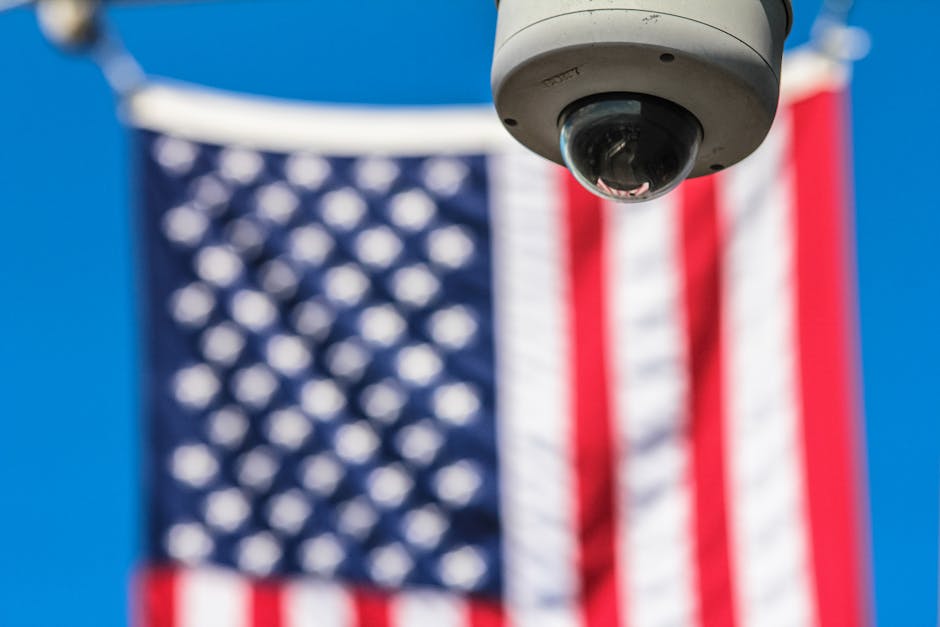
Why Modern Businesses Are Investing in CCTV Surveillance Technology
CCTV surveillance cameras have become essential security infrastructure for businesses, providing 24/7 monitoring, evidence collection, and crime deterrence at a fraction of the cost of security personnel. Key benefits include:
- Crime Prevention: Studies show CCTV reduces crime by 24-28% in public areas.
- Cost Savings: Up to 94% less expensive than hiring security guards annually.
- Remote Monitoring: View live footage from anywhere with an internet connection.
- Evidence Collection: High-definition video for investigations and insurance claims.
- Employee Safety: Monitor workplace hazards and ensure compliance.
The security landscape has evolved dramatically. Today's IP-based CCTV systems offer 4K resolution, AI analytics, and cloud storage, far surpassing older analog technology.
For construction sites and commercial properties, security challenges like theft and vandalism are complex and costly. Modern CCTV systems address these issues with weatherproof designs, night vision, and real-time alerts.
This guide will help you understand the key components of professional CCTV systems, evaluate advanced features, and steer the legal considerations for proper installation. Choosing the right surveillance technology is crucial for protecting your assets and operations.
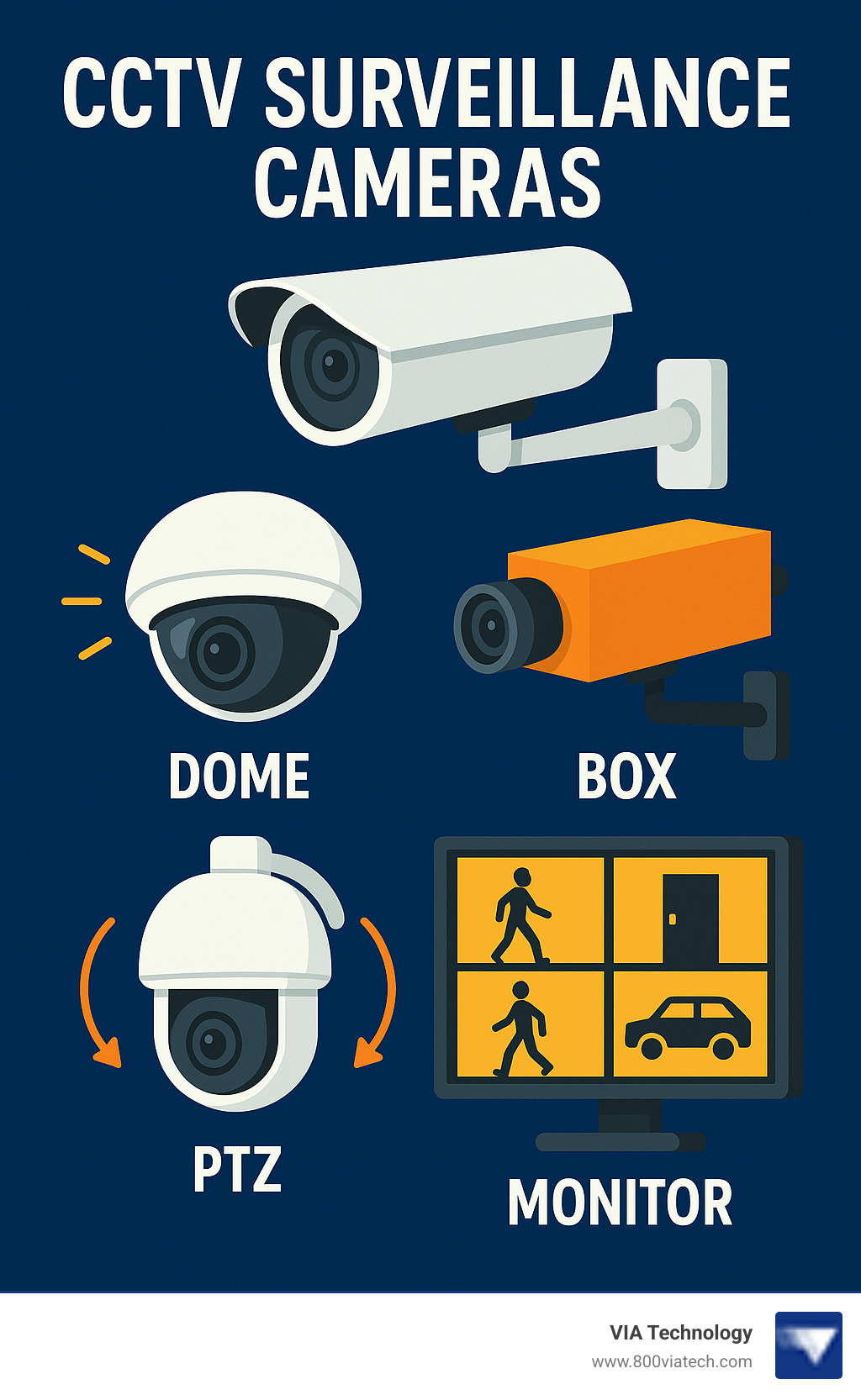
Understanding CCTV Surveillance: The Basics
CCTV, or "Closed-Circuit Television," creates a private video network for your business, keeping sensitive footage secure. Unlike broadcast TV, your video feed is only accessible to authorized users.
How CCTV Systems Work
Modern CCTV surveillance cameras operate simply: cameras capture video 24/7, which travels via cables or wireless signals to a central recorder. For today's IP-based systems, this is a Network Video Recorder (NVR), which manages and stores all footage. The system can display a live feed on-site, but its key advantage is remote access. Using a smartphone, tablet, or computer, you can monitor your construction site or commercial property from anywhere.
This real-time visibility allows you to monitor worker safety, check project progress, and address security issues before they escalate, changing how you manage your business.
Core Components of a Modern CCTV System
A professional CCTV surveillance camera system includes several key components working together:
- Cameras: The system's eyes. Common types for commercial use include Bullet cameras (highly visible deterrents), Dome cameras (discreet and vandal-resistant), and PTZ (Pan-Tilt-Zoom) cameras for flexible coverage over large areas. Specialized options like Thermal cameras detect heat signatures in total darkness, while License Plate Recognition (LPR) cameras track vehicle access.
- Network Video Recorder (NVR): The brain of an IP system, the NVR records and manages footage. Many include Power over Ethernet (PoE) ports, which send power and data over a single Ethernet cable, simplifying installation.
- Cabling and Software: Ethernet cabling provides the high-speed connection for clear digital video. Video Management Software (VMS) is the user interface for viewing live feeds, reviewing recordings, and managing alerts.
- Power and Display: A reliable power supply, often with a backup, ensures the system is always on. Monitors are used for on-site viewing.
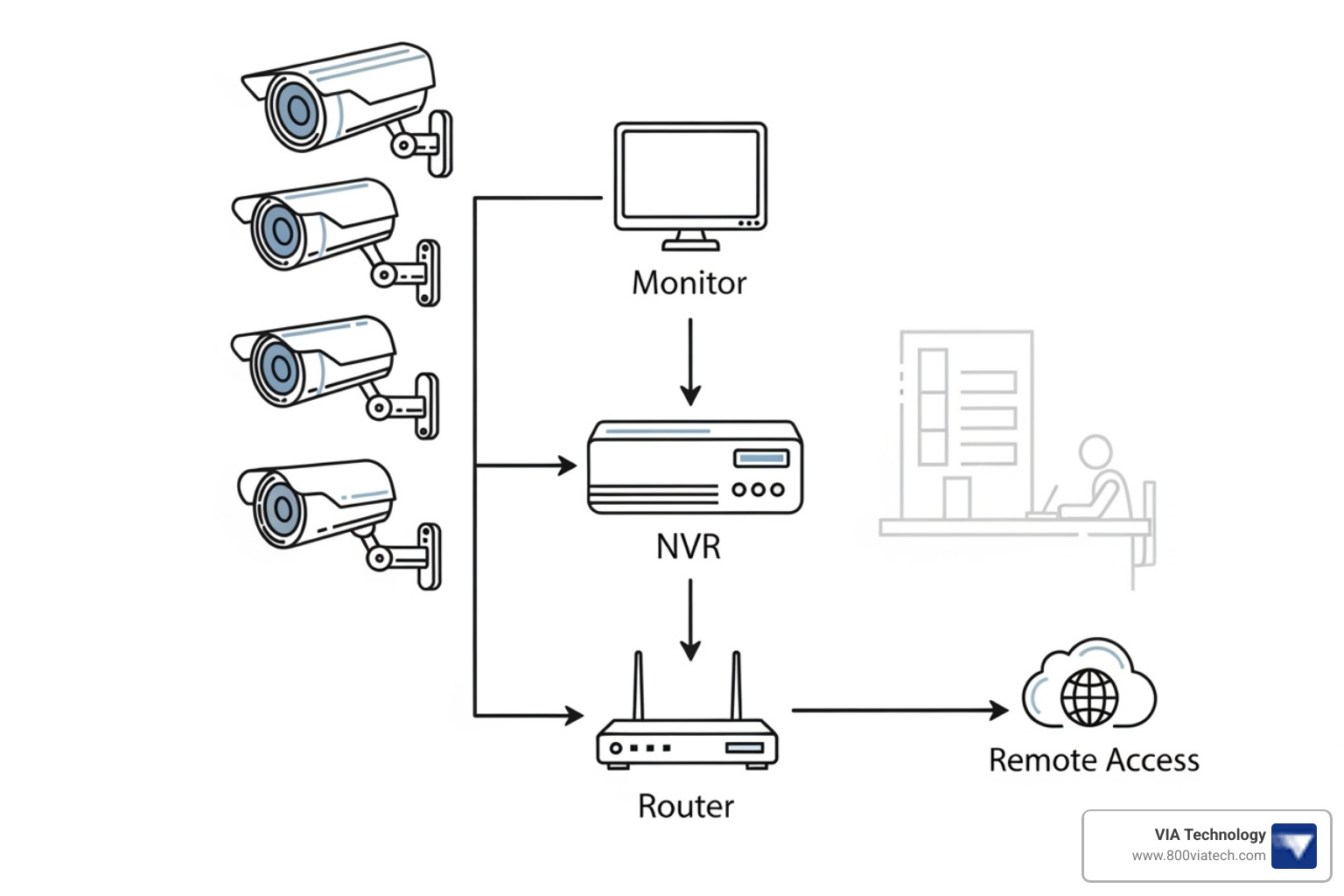
Why Your Business Needs CCTV Surveillance
For businesses, especially in the construction industry, managing a site 24/7 is impossible. Equipment theft, vandalism, and safety incidents are constant risks. CCTV surveillance cameras provide a powerful, modern solution to these challenges.
Key Benefits for Construction Sites and Commercial Properties
- Crime and Vandalism Deterrence: Visible cameras are a powerful deterrent. Research shows that CCTV reduces crime by 24-28% in public areas, preventing theft of tools, materials, and machinery.
- Asset Protection: Keep a watchful eye on high-value equipment and materials, gathering clear evidence if an incident occurs.
- Improved Employee Safety: Monitor for safety protocol compliance, identify hazards, and document incidents to prevent future accidents.
- Remote Site Monitoring: Check on your site from anywhere, at any time, giving you peace of mind and the ability to respond quickly to issues.
- Insurance Premium Reduction: Many insurers offer lower rates for businesses with professional surveillance systems.
Common Applications in Commercial and Industrial Settings
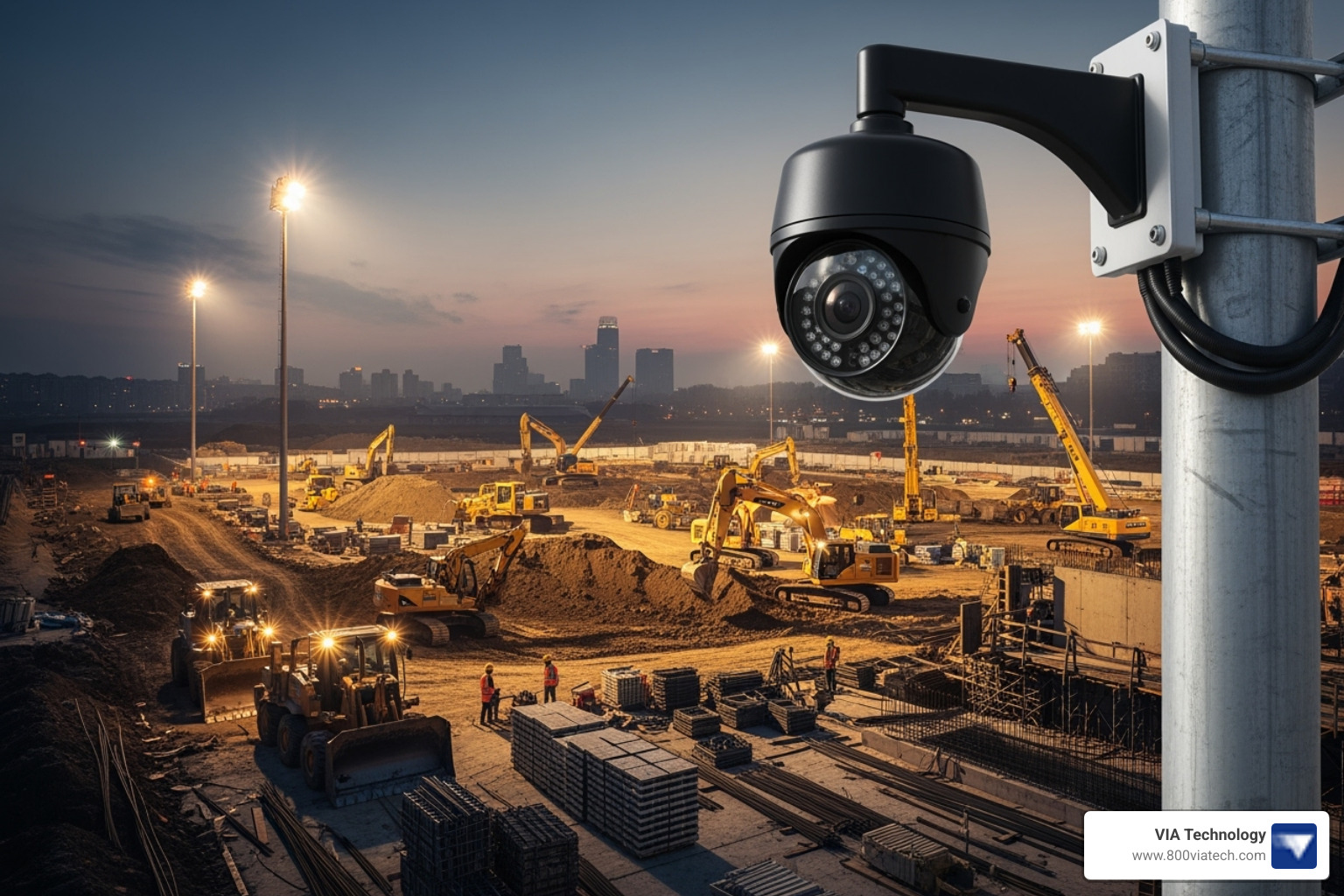
CCTV surveillance cameras are versatile tools used for more than just security:
- Monitoring Project Progress: Watch your project unfold in real-time to spot delays and workflow issues without constant site visits.
- Securing Materials and Tools: Place cameras around storage areas and entry points to protect your most valuable assets.
- Ensuring Safety Compliance: Use footage to verify that safety standards are being met and to train staff.
- Managing Site Access: See who is coming and going, preventing unauthorized entry and improving logistical control.
- Warehouse and Inventory Management: Track inventory movement, prevent internal theft, and optimize logistics.
Cost-Effectiveness: CCTV Surveillance vs. On-Site Security Guards
The financial case for CCTV surveillance cameras is compelling. According to the U.S. Bureau of Labor Statistics, a single security guard can cost over $29,000 annually. For 24/7 coverage, this cost multiplies into six figures.
In contrast, a CCTV system is a long-term investment, not a recurring expense. It provides 24/7 automated surveillance for a fraction of the price, with studies showing potential savings of up to 94% annually compared to guards. Cameras work tirelessly without sick days or vacations, and the video evidence they provide can reduce liability and protect your business from false claims, saving you thousands in potential legal fees.
Key Considerations for Your Business's CCTV Surveillance Cameras
Choosing the right CCTV surveillance cameras involves understanding the technology that drives modern security. From system architecture to intelligent features, the right choices make your surveillance smarter and more effective.
IP Systems: The Modern Standard for Business Security
IP (Internet Protocol) systems are the gold standard for business security, far surpassing older analog technology. Unlike analog systems that use coaxial cables and have limited capabilities, IP systems transmit high-quality digital video over a network, offering superior performance and flexibility.
Key advantages of IP systems for businesses include:
- High Resolution: IP cameras offer crystal-clear 4K resolution, capturing critical details like license plates or faces from a distance.
- Scalability: Adding new cameras to an IP network is simple, often requiring just a connection to your existing network infrastructure.
- Advanced Analytics: IP systems support AI-powered features that reduce false alarms and provide actionable insights.
- Secure Remote Access: Monitor your site from anywhere through encrypted connections, ensuring your footage remains private.
For businesses with existing analog cameras, hybrid systems allow a gradual, cost-effective upgrade to IP technology.
Advanced Features in Modern CCTV Surveillance Cameras
Today's CCTV surveillance cameras are packed with useful features that solve real-world business challenges:
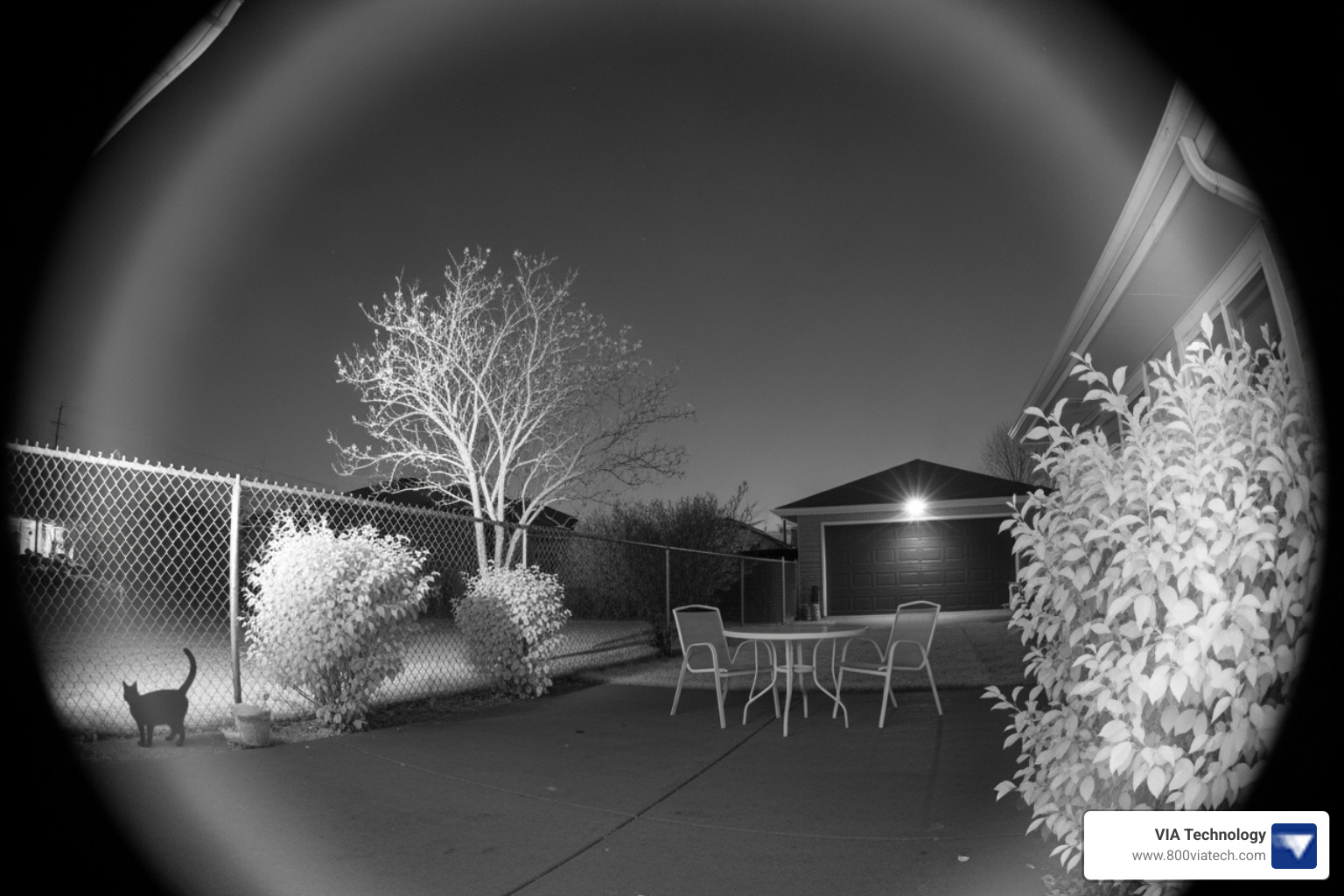
- 4K Ultra HD Resolution: Provides undeniable clarity for investigations and operational oversight.
- Advanced Night Vision: Modern infrared (IR) and full-color night vision technologies deliver clear images in low-light or total darkness.
- Pan-Tilt-Zoom (PTZ): A single PTZ camera can monitor large areas, allowing operators to follow activity and zoom in on details remotely.
- AI-Powered Analytics: These are the real game-changers. Features like person and vehicle detection filter out irrelevant motion, while License Plate Recognition (LPR) automates vehicle logging. Thermal imaging can detect intruders or overheating equipment in any lighting condition.
System Integration: Creating a Unified Security Network
A standalone CCTV system is useful, but its true power is opened up through integration. Creating a unified security ecosystem where all your systems work together provides comprehensive protection.
- Access Control Integration: Link cameras to key card readers or gates. When access is granted or denied, the camera can automatically record the event, providing immediate visual verification.
- Alarm and Sensor Integration: Connect your cameras to motion sensors and alarm systems. This allows you to instantly see what triggered an alert, dramatically reducing false alarms.
At VIA Technology, our expertise in IT and IoT integration allows us to design systems that work seamlessly together. The result is a security network that doesn't just record events—it helps prevent problems, streamlines operations, and provides valuable business insights.
Legal and Ethical Guidelines for CCTV Installation
Installing CCTV surveillance cameras is a smart security move, but it requires careful attention to privacy laws and regulations. Using cameras responsibly protects your business from legal issues while respecting individual rights.
Understanding Privacy Laws and Regulations
Video surveillance laws generally hinge on the concept of a "reasonable expectation of privacy."
- Public vs. Private Spaces: You can generally monitor public-facing areas and common work zones on your property. However, installing CCTV surveillance cameras in areas where privacy is expected, such as restrooms or changing rooms, is illegal and unethical.
- Employee Monitoring: Be transparent with your staff. Inform them about surveillance through a clear, written policy. In many states, this is a legal requirement.
- Required Signage: Most jurisdictions require clear and visible signs indicating that video surveillance is in use.
- Data Storage and Protection: You are responsible for securing recorded footage. This includes controlling access, using encryption, and adhering to data retention laws specific to your industry and location. For general guidance, the ACLU guidance on video surveillance offers helpful insights.
It is always best to consult with a legal professional to ensure compliance with local and federal laws.
Audio Recording Laws and Best Practices
Audio recording is far more legally complex than video due to wiretapping laws. Consent is the key issue:
- Consent Requirements: Federal law requires "one-party consent" (only one person in the conversation needs to know they're being recorded). However, many states require "two-party" or "all-party consent."
- Legal Risks: Recording audio without the proper consent can lead to severe legal penalties, and the footage may be inadmissible in court.
Our advice: Avoid recording audio with your CCTV surveillance cameras unless you have a specific, legally-vetted reason. Video alone provides powerful security benefits without the significant legal risks associated with audio.
Frequently Asked Questions about CCTV Systems
Here are answers to common questions from business owners considering CCTV surveillance cameras.
Can wireless security cameras function without Wi-Fi?
Yes. For remote locations like construction sites without reliable internet, there are several options:
- Cellular Cameras: These use 4G/5G networks to transmit video, requiring a data plan and SIM card.
- Local Storage: Many cameras have SD card slots to record footage locally, ensuring no data is lost during an internet outage.
- Point-to-Point Wireless: These systems create a private wireless network between cameras and the recorder, offering a reliable connection independent of Wi-Fi.
For maximum reliability, wired Power over Ethernet (PoE) cameras remain the gold standard.
How much should a business expect to spend on a CCTV system?
The cost of a CCTV surveillance camera system varies widely based on several factors:
- Number and Type of Cameras: A system with a few basic cameras will cost less than one with dozens of advanced PTZ, thermal, or LPR cameras.
- Resolution and Storage: Higher resolution (like 4K) requires more storage capacity.
- Installation Complexity: The cost depends on the size and layout of your property.
- Monitoring Services: Professional 24/7 monitoring is an additional service.
Because every business is unique, a professional consultation is the best way to get an accurate quote for a system custom to your needs.
How is CCTV footage stored and for how long?
There are three main storage methods for CCTV surveillance cameras:
- On-Premise Storage: Footage is recorded to a Network Video Recorder (NVR) or Digital Video Recorder (DVR) located on your property. This is the most common method for businesses.
- Cloud Storage: Video is uploaded to secure remote servers, protecting it from on-site theft or damage. This typically involves a subscription fee.
- Hybrid Solutions: A combination of on-premise and cloud storage offers the best of both worlds, backing up critical events to the cloud while keeping general footage local.
Retention periods (how long you keep footage) depend on your business needs, industry regulations, and legal requirements, but often range from 30 to 90 days.
Conclusion
Modern CCTV surveillance cameras are an essential investment for any business, offering constant, intelligent vigilance that traditional security cannot match. From deterring crime and protecting assets to improving employee safety and enabling remote monitoring, these systems provide immense value and peace of mind.
Today's IP-based systems with 4K resolution, AI-powered analytics, and seamless integration capabilities have transformed business security. They are not only more effective but also significantly more cost-effective than hiring security guards, providing a powerful return on investment.
However, a successful implementation requires more than just hardware. It demands expert planning, professional installation, and a deep understanding of legal compliance. That's where VIA Technology makes the difference. We specialize in designing and integrating custom security solutions for businesses across Texas, particularly for the unique challenges of the construction industry.
Our comprehensive approach, from design to 24/7 support, ensures your CCTV surveillance cameras become part of a robust technology ecosystem that saves you time and money. We deliver the reliability and performance your business depends on.
Ready to take the next step in securing your business? A well-designed CCTV system is a powerful asset. Learn how VIA Technology can help you implement a robust surveillance solution that's built for your specific needs and grows with your business.


